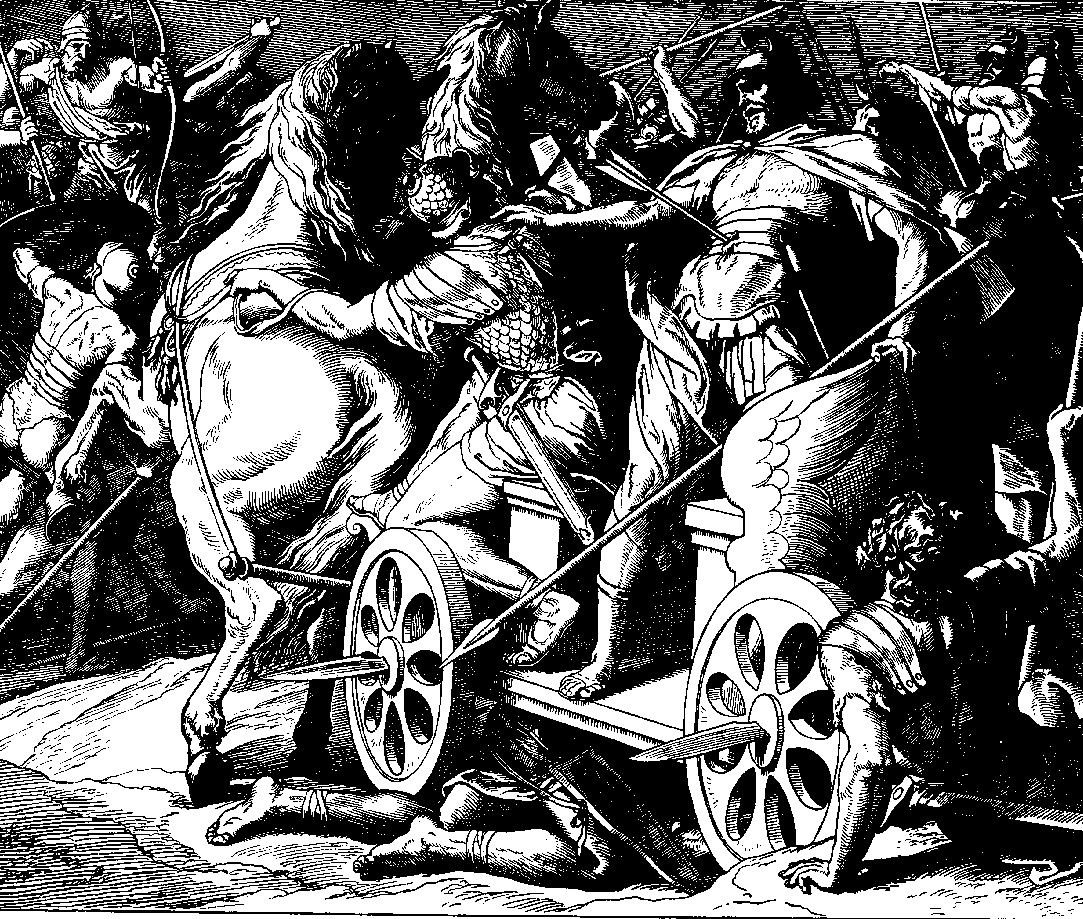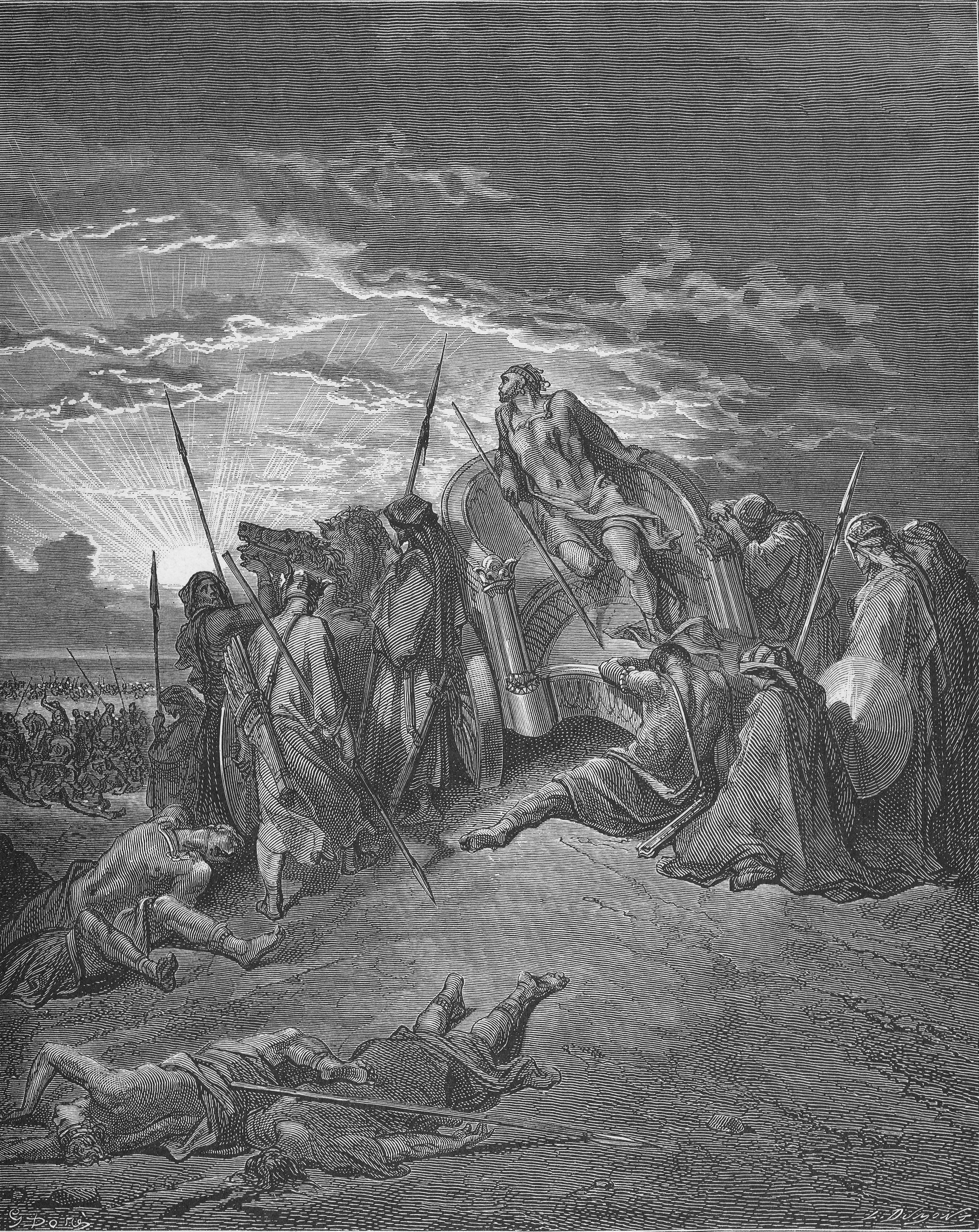|
Jehu (prophet)
Jehu (, ; he, יֵהוּא , "Yah is He") son of Hanani was a prophet mentioned in the Hebrew Bible, who was active during the 9th century BC. Biblical account According to the Bible, Jehu condemned Baasha, king of Israel, and the House of Baasha (1 Kings 16:7), accusing him of leading the people into the sin of idolatry like his predecessor Jeroboam. Jehu foretold that: :''surely odwill take away the posterity of Baasha and the posterity of his house, and ... will make your house like the house of Jeroboam the son of Nebat. The dogs shall eat whoever belongs to Baasha and dies in the city, and the birds of the air shall eat whoever dies in the fields.'' () His words were fulfilled in the reign of Elah, Baasha's son, when the traitor Zimri assassinated Elah and murdered all of Baasha's family and associates. () Jehu also challenged Jehoshaphat, king of Judah. Jehoshaphat's alliance with Ahab ended in the latter's death at the Battle of Ramoth-Gilead. Jehoshaphat returned s ... [...More Info...] [...Related Items...] OR: [Wikipedia] [Google] [Baidu] |
Prophet Jheu Jehu - 1526
In religion, a prophet or prophetess is an individual who is regarded as being in contact with a divine being and is said to speak on behalf of that being, serving as an intermediary with humanity by delivering messages or teachings from the supernatural source to other people. The message that the prophet conveys is called a prophecy. Claims of prophethood have existed in many cultures and religions throughout history, including Judaism, Christianity, Islam, ancient Greek religion, Zoroastrianism, Manichaeism, Hinduism , and many others. Etymology The English word ''prophet'' is the transliteration of a compound Greek word derived from ''pro'' (before/toward) and ''phesein'' (to tell); thus, a προφήτης (''prophḗtēs'') is someone who conveys messages from the divine to humans, including occasionally foretelling future events. In a different interpretation, it means advocate or speaker. In Hebrew, the word נָבִיא (''nāvî''), "spokesperson", traditionally tra ... [...More Info...] [...Related Items...] OR: [Wikipedia] [Google] [Baidu] |
Zimri (king)
Zimri ( Hebrew: , ''Zīmrī'', lit. ''"praiseworthy"'', also transliterated as Zambri due to a Greek corruption of Omri), was the fifth king of Israel. His reign lasted only seven days. William F. Albright has dated his reign to 876 BCE, while E. R. Thiele offers the date 885 BCE. His story is told in ''1 Kings'', Chapter 16. Ancestry According to Louis Ginzberg, Zimri was the only monarch born from the Tribe of Simeon. Reportedly, this Tribe never received a blessing from Moses, and did not have an impact in the royal successions of Israel.Ginznberg (1998), p. 155 In ''Judah's Sceptre and Joseph's Birthright'' (1902), J. H. Allen suggested that Zimri was a descendant of Zerah. Zerah is a character in the Book of Genesis, one of the twin sons of Judah and Tamar. Zerah was the twin brother Perez, and one of the founding members of the Tribe of Judah.Allen (1997), pp. 199–207 Allen's speculation was based on the Books of Chronicles. In 1 Chronicles 2:6, another charac ... [...More Info...] [...Related Items...] OR: [Wikipedia] [Google] [Baidu] |
10th-century BCE Hebrew People
1 (one, unit, unity) is a number representing a single or the only entity. 1 is also a numerical digit and represents a single unit of counting or measurement. For example, a line segment of ''unit length'' is a line segment of length 1. In conventions of sign where zero is considered neither positive nor negative, 1 is the first and smallest positive integer. It is also sometimes considered the first of the infinite sequence of natural numbers, followed by 2, although by other definitions 1 is the second natural number, following 0. The fundamental mathematical property of 1 is to be a multiplicative identity, meaning that any number multiplied by 1 equals the same number. Most if not all properties of 1 can be deduced from this. In advanced mathematics, a multiplicative identity is often denoted 1, even if it is not a number. 1 is by convention not considered a prime number; this was not universally accepted until the mid-20th century. Additionally, 1 is the s ... [...More Info...] [...Related Items...] OR: [Wikipedia] [Google] [Baidu] |
Northern Kingdom Of Israel
The Kingdom of Israel (), or the Kingdom of Samaria, was an Israelites, Israelite kingdom in the Southern Levant during the Iron Age. The kingdom controlled the areas of Samaria, Galilee and parts of Transjordan (region), Transjordan. Its capital, for the most part, was Samaria (ancient city), Samaria (modern Sebastia, Nablus, Sebastia). The Hebrew Bible depicts the Kingdom of Israel as one of two successor states to the former Kingdom of Israel (united monarchy), United Kingdom of Israel ruled by King David and his son Solomon, the other being the Kingdom of Judah; most historians and archaeologists, however, do not believe in the existence of a United Kingdom as depicted in the Bible.The debate is described in Amihai Mazar, "Archaeology and the Biblical Narrative: The Case of the United Monarchy" (see bibliography), p.29 fn.2: "For conservative approaches defining the United Monarchy as a state “from Dan to Beer Sheba” including “conquered kingdoms” (Ammon, Moab, Edom ... [...More Info...] [...Related Items...] OR: [Wikipedia] [Google] [Baidu] |
Ben-Hadad I
Ben-Hadad I ( he, בן הדד, translit=bn hdd; arc, בר הדד, translit=br hdd), son of Tabrimmon and grandson of Hezion, was king of Aram-Damascus between 885 BC and 865 BC. Ben-Hadad I was reportedly a contemporary of kings Baasha of the Kingdom of Israel and Asa of the Kingdom of Judah. According to the biblical book of Kings, Asa called on Ben-Hadad I to aid him in attacking northern Israel while Baasha restricted access to Jerusalem through border fortifications. Ben-Hadad took the towns of "Ijon, Dan, Abel-beth-maachah, and all Chinneroth, with all the land of Naphtali" (). This acquisition gave Aram-Damascus control of the trade route to southern Phoenicia. By the time of the reign of Ahab, the area was back in Israelite hands. According to the archaeologist William Foxwell Albright, the Melqart stele should be attributed to Ben-Hadad I. However, Kenneth Kitchen disagrees and states that there is no actual evidence that connects that stele to this particular king. ... [...More Info...] [...Related Items...] OR: [Wikipedia] [Google] [Baidu] |
Asa Of Judah
Asa (; el, Ασά; la, Asa) was, according to the Hebrew Bible, the third king of the Kingdom of Judah and the fifth king of the Davidic line, House of David. The Hebrew Bible gives the period of his reign between 40–41 years. His reign is dated between 913–910 BC to 873–869 BC. He was succeeded by Jehoshaphat, his son (by Azubah (mother of Jehoshaphat), Azubah). According to Edwin R. Thiele, Thiele's chronology, when Asa became very ill, he made Jehoshaphat coregent. Asa died two years into the coregency. Asa was zealous in maintaining the traditional worship of God, and in rooting out idolatry, with its accompanying immoralities. After concluding a battle with Zerah of Ethiopia in the 10th year of his reign, there was peace in Judah () until the 36th year of Asa's reign (). In his 36th year he was confronted by Baasha of Israel, Baasha, king of Kingdom of Israel (Samaria), Israel. He formed an alliance with Ben-Hadad I, king of Aram Damascus, and using a monetary bribe, ... [...More Info...] [...Related Items...] OR: [Wikipedia] [Google] [Baidu] |
Asherah Pole
An Asherah pole is a sacred tree or pole that stood near Canaanite religion, Canaanite religious locations to honor the Ugaritic mother goddess Asherah, consort of El (deity), El. The relation of the literary references to an ''asherah'' and archaeological finds of Judaean pillar-figurines has engendered a literature of debate. The asherim were also cult objects related to the worship of Asherah, the consort of either Ba'al or, as inscriptions from Kuntillet Ajrud, Kuntillet ‘Ajrud and Khirbet el-Qom attest, Yahweh, and thus objects of contention among competing cults. In translations of the Hebrew Bible that render the Hebrew ''asherim'' ( ''’ăšērīm'') or ''asheroth'' ( ''’ăšērōṯ'') into English as "Asherah poles", the insertion of "pole" begs the question by setting up unwarranted expectations for such a wooden object: "we are never told exactly what it was", observes John Day. The traditional interpretation of the Biblical text is that the Israelites imported pag ... [...More Info...] [...Related Items...] OR: [Wikipedia] [Google] [Baidu] |
Battle Of Ramoth-Gilead
Ramoth-Gilead ( he, רָמֹת גִּלְעָד, meaning "Heights of Gilead"), was a Levitical city and city of refuge east of the Jordan River in the Hebrew Bible, also called "Ramoth in Gilead" (; ; ) or "Ramoth Galaad" in the Douay–Rheims Bible. It was located in the tribal territorial allotment of the tribe of Gad. Biblical events According to (), Ramothgilead was the base of Ben-Geber, one of King Solomon's regional governors. He was responsible for ("to him belonged") the towns of Jair the son of Manasseh, in Gilead and the region of Argob in Bashan: sixty large cities with walls and bronze gate-bars. It appears to have been lost to Syria (Aram-Damascus) during the battles between the northern kingdom of Israel and Syria, as Ahab, King of Israel, proposed to go to battle to win it back. After consulting prophets about the prospects of success, Ahab went to fight for Ramoth in Gilead, aided by Jehoshaphat, King of Judah. During the battle, Ahab was wounded by an arrow. ... [...More Info...] [...Related Items...] OR: [Wikipedia] [Google] [Baidu] |
Ahab
Ahab (; akk, 𒀀𒄩𒀊𒁍 ''Aḫâbbu'' [''a-ḫa-ab-bu'']; grc-koi, Ἀχαάβ ''Achaáb''; la, Achab) was the seventh king of Kingdom of Israel (Samaria), Israel, the son and successor of King Omri and the husband of Jezebel of Sidon, according to the Hebrew Bible. The Hebrew Bible presents Ahab as a wicked king, particularly for condoning Jezebel's influence on religious policies and his principal role behind Naboth's arbitrary execution. The existence of Ahab is historically supported outside the Bible. Shalmaneser III of Assyria documented in 853 BC that he defeated an alliance of a dozen kings in the Battle of Qarqar; one of these was Ahab. He is also mentioned on the inscriptions of the Mesha Stele. Ahab became king of Israel in the thirty-eighth year of King Asa of Judah, and reigned for twenty-two years, according to 1 Kings. William F. Albright dated his reign to 869–850 BC, while Edwin R. Thiele offered the dates 874–853 BC. Most recently, Michael Coogan ... [...More Info...] [...Related Items...] OR: [Wikipedia] [Google] [Baidu] |
Jehoshaphat
Jehoshaphat (; alternatively spelled Jehosaphat, Josaphat, or Yehoshafat; ; el, Ἰωσαφάτ, Iosafát; la, Josaphat), according to 1 Kings 22:41, was the son of Asa, and the fourth king of the Kingdom of Judah, in succession to his father. His children included Jehoram, who succeeded him as king. His mother was Azubah. Historically, his name has sometimes been connected with the Valley of Josaphat. Reign 2 Chronicles chapters 17 to 21 are devoted to the reign of Jehoshaphat. 1 Kings 15:24 mentions him as successor to Asa, and 1 Kings 22:1-50 summarizes the events of his life. The Jerusalem Bible states that "the Chronicler sees Asa as a type of the peaceful, Jehoshaphat of the strong king". According to these passages, Jehoshaphat ascended the throne at the age of thirty-five and reigned for twenty-five years. He "walked in the ways" of his father or ancestor, King David. He spent the first years of his reign fortifying his kingdom against the Kingdom of Israel. His ... [...More Info...] [...Related Items...] OR: [Wikipedia] [Google] [Baidu] |
King Elah
Elah ( he, אֵלָה ''’Ēlā''; el, Ἠλά; la, Ela) was the fourth king of Israel, the son and successor of Baasha. William F. Albright has dated his reign to 877–876 BCE, while E. R. Thiele offers the dates 886–885 BCE.Edwin Thiele, ''The Mysterious Numbers of the Hebrew Kings'', (1st ed.; New York: Macmillan, 1951; 2d ed.; Grand Rapids: Eerdmans, 1965; 3rd ed.; Grand Rapids: Zondervan/Kregel, 1983). , 9780825438257 Chapter 16 of 1 Kings relates how Elah and all his family members were murdered by his chariot commander Commander (commonly abbreviated as Cmdr.) is a common naval officer rank. Commander is also used as a rank or title in other formal organizations, including several police forces. In several countries this naval rank is termed frigate captain. ... Zimri, who became his successor. References External links 1 Kings Chapter 16"Elah", ''Jewish encyclopedia'' 880s BC deaths 9th-century BC Kings of Israel 9th-century BC murdered mo ... [...More Info...] [...Related Items...] OR: [Wikipedia] [Google] [Baidu] |
Hanani
The word Hanani ( he, חנני ''Ḥănānî'') means "God has gratified me" or "God is gracious". Hanani is the name of four men mentioned in the Hebrew Bible: * One of the sons of Heman (1 Chronicles 25:4, 25). * A "seer" or prophet who was sent to rebuke king Asa of Judah for entering into a league with Ben-Hadad I Ben-Hadad I ( he, בן הדד, translit=bn hdd; arc, בר הדד, translit=br hdd), son of Tabrimmon and grandson of Hezion, was king of Aram-Damascus between 885 BC and 865 BC. Ben-Hadad I was reportedly a contemporary of kings Baasha of the ..., List of Syrian monarchs, king of Syria, against the Northern Kingdom of Israel, northern kingdom of Israel. Hanani was imprisoned in stocks by Asa (2 Chronicles 16:7-10). This Hanani was also probably the father of the prophet Jehu (prophet), Jehu, who rebuked Baasha of Israel, Baasha, king of the northern kingdom (1 Kings 16:1-4, 7) and Jehoshaphat , king of the southern kingdom (2 Chronicles 19:1-3). The Pulpit Com ... [...More Info...] [...Related Items...] OR: [Wikipedia] [Google] [Baidu] |

.jpg)





